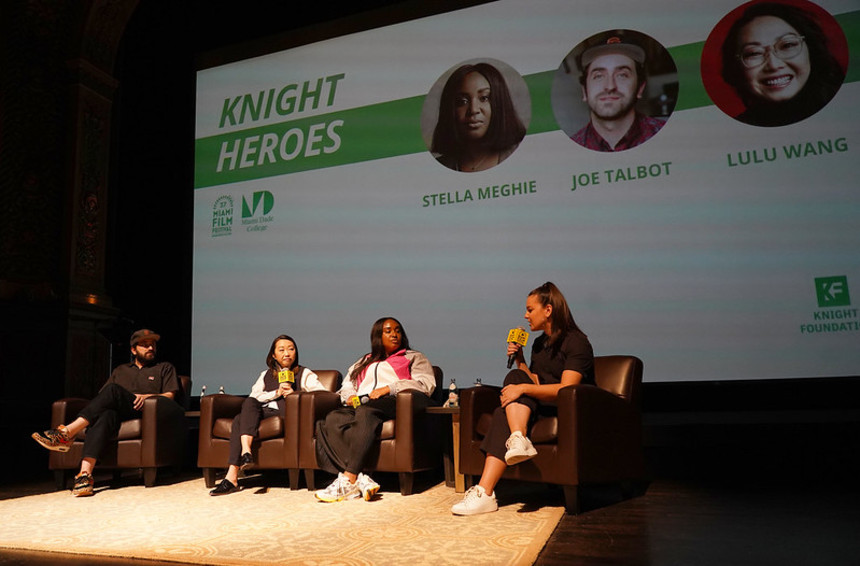Miami 2020: Knight Heroes Talk

Film Festival master classes offer a chance for the audience to get a little more up close and personal with important filmmakers: to learn more about how they approach their work, some tricks of the trades, and the triumphs and difficulties with making independent cinema today. At this year's Miami Film Festival, three such filmmakers - Stella Meghie, Joe Talbot, and Lulu Wang - gave addresses about their work process, where they came from, and how they got to where they are. The theme of the day was heroism - who are our heroes, what makes a hero, and how does it appear in films, either in front of or behind the camera.
Stella Meghie, a Toronto native, has directed four feature films, including Everything, Everything and the recently released romantic drama The Photograph, starring Issa Rae and Lakeith Stanfield. Growing up, her first connection with film came from seeing the work of Spike Lee; seeing black filmmakers exploring their lives and the lives of those in black communities, gave her the courage to pursue filmmaking. Meghie in paricular wanted to explore the psyche of black women, and show that they, and by extension the audience, could each be the hero of their own story. She discussed how each filmmaker has to be their own champion - and how one has to question how this can be accomplished.
For Meghie, she had to figure where she could push the boundaries, and what would make her do her best work; as a black woman especially, she couldn't go by a blueprint that wasn't made for her, as the film industry, when she was starting, and still to a great extent, still doesn't want to recognize the talent of black women. Meghie needed to be scrappy and fearless to get the funds for her first film Jean of the Joneses. Its success was such that she was hired for Everything, Everything, a film about a teenager with a serious autoimmune disease. Going to her third film, The Weekend, Meghie knew that she could work with a smaller budget; in fact, it was better to execute her vision. She had written the script for The Photograph years before, but her track record was such that she was able to find the financing, and secure a prominent cast, and yet still have creative control to make the film she wanted. For Meghie, heroism was about finding and sticking to your own voice.
The Last Black Man in San Francisco launched at Sundance in 2019, and it won Joe Tablot the Best Director award. But the journey to the film was not an easy one. For Talbot, he was looking to the heroes of his life that inspired the film, as well as the city, his hometown, for which the film is both an homage and a critique. If your hometown turns into a place that you don't recognize, and in which you no longer feel welcome, should you stay or should you go? Do our cities deserve our love? If you leave and come back, what is left for you? How does a life in a changing city affect your work? These were questions Talbot and his main collaborator (and co-writer and star of the film) Jimmie Fails asked themselves.
Talbot admits that he was lost and angry, at a place that he loved and yet seemed to reject him and his circle of creative-minded friends. Gentrification was (and is) driving away those that had made the city his beloved home. Talbot discussed how he and his friends would spend much of their time watching movies, which lead to the coillaboration on the story and eventual script. For Talbot, the heroes were those around him, with everyone working together and supporting each other. The journey to the film (which took four years to be financed) was working with friends, working from what they knew, and finding the right people to make the dream a reality.
To make her second feature The Farewell, which was based on a story from her own life, Lulu Wang had to look at heroism in a different way. For her, she had to question what makes a hero, or maybe, what she needed was an anti-hero. She asked twitter to tell her how they saw the difference between an anti-hero and a villain, and got some interesting answers. Was there a hero in her story? Was there a villain? A main theme of the story is about choosing - should the individual choose for themselves, or do they owe something to their loved ones? Wang said that some of her producers wanted a change in the script [spoilers ahead], that Nai Nai should find out that she had cancer, in order to create more drama in the classic American style.
This lead Wang even deeper into her question of what makes a hero, or anti-hero. How would her main character Billi, be heroic if she couldn't save or change anyone? Does this mean that Billi is an anti-hero? Villains are traditionally the ones creating the obstacle - but in her film, there is the obstacle Billi creates by wanting to tell the truth, and the one her family creates by wanting to keep the secret. Is her family doing the right thing for the wrong reasons? Wang wanted to look at ideas of heroism, how giving your characters the time and attention they deserve can change how we define it, and our perspective. Wang changed the traditional rules of the story in order to tell an authentic tale. As she pointed out at the end of her speech, you remain the hero of your own story, even if at times you might the villain of someone else's.







